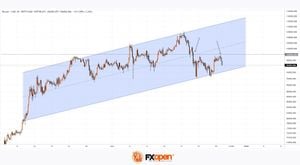BRUSSELS, February 6, 2025 – Recent escalations of gang violence have captured the attention of Brussels, as drug-related turf wars lead to brazen shootings throughout the city. From the underground of the Clémenceau metro station to the streets of Saint-Josse, the chaotic scene reflects the troubling intersection of narcotics and criminal activity being witnessed this week.
According to prosecutor Julien Moinil, the violence has reached alarming levels. He stated, "It is regrettable…three shootings…in just 24 hours—one in Saint-Josse and two in Clémenceau. This is completely unacceptable.” The severity of the situation has left both law enforcement and the community on high alert.
An overview of the incidents reveals how violence has become so pervasive. The first shooting occurred early Wednesday morning, with witnesses reporting armed men using Kalashnikov-style rifles outside the Clémenceau metro station. Surveillance cameras captured the disarray as gunfire erupted, prompting significant police action to locate the suspects. Within hours, another shooting surfaced—a separate attack not far from the European Quarter, signaling the potential for retaliatory violence.
The chaotic nature continued overnight, with another round of gunfire reported at the Clémenceau metro station, heightening fears of widespread gang warfare. Local residents voiced their frustrations to The Brussels Times, remarking, "The area has cafés…to hide what is going on inside, or hairdressers…involved in completely different shady business.” With such visible disregard for the law, public calls for action are intensifying.
Moinil shared concerns about whether law enforcement is equipped to handle the current trend of violence tied to drug trafficking, which he believes is part of broader, organized gang activities. "We have observed suspicious activities...that suggest these are retaliatory actions aimed at seizing territory,” he commented. This indicates the brazen nature of the individuals involved and their willingness to infringe upon public safety.
Adding to the depth of the concern, local officials are voicing frustrations over what they describe as ineffectual policing efforts. One member of the local government compared the dramatic escalation to popular crime dramas like The Wire, noting the alarming presence of drugs and violence on the streets. This comparison reflects the surreal reality facing many urban areas coping with gang-related issues.
The mayor of Anderlecht, where many of the incidents occurred, highlighted how the lucrative drug trade has not only enriched gangs but also equipped them with deadlier firepower, amplifying the threat to public safety. This region of Brussels is known for being intertwined with larger trafficking networks extending beyond Belgium’s borders. Local authorities stress the need for cooperation among various police forces to effectively combat the growing violence.
Yet skepticism lingers over whether current strategies are effective. The fragmentation of police zones within Brussels has called the efficiency of law enforcement measures under scrutiny. The new Minister of Foreign Affairs expressed confusion over why there is still adherence to this separation, particularly as it appears increasingly ineffective amid rising crime rates. Comments from local leaders reflect the frustration over persistent violence and the seeming inability of the judicial system to impose adequate penalties.
Another source of concern come from the comments of the public prosecutor, who remarked, "Impunity is the enemy of the rule of law,” pointing to systemic failures where repeat offenders face minimal consequences. The prosecutor emphasized the importance of serving full prison sentences to deter crime effectively. Each shooting raises questions about justice and accountability, feeding residents’ growing fears about their security. "You go to work, you take the underground, you see weapons of war…" shared another local figure, emphasizing how prevalent dangers have become.
The recent shootings have stirred urgent calls from communities for local government discussions intended to address public safety concerns and reinstate effective governance. Diverging opinions on whether enough action is being taken lends to the complexity of the situation as contending criminal factions continue their standoff. The interplay of rising violence and calls for political solutions indicates the uneasy balance Brussels is attempting to maintain.
Residents remain anxious as they navigate their daily lives amid the threat of violence, craving decisive measures to reclaim their neighborhoods. With each incident, it’s clear the city of Brussels stands at a crossroads, needing to address the underlying issues of drug trafficking and gang violence before the situation spirals even more out of control.



